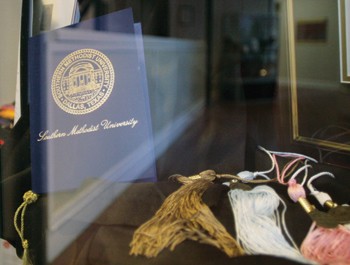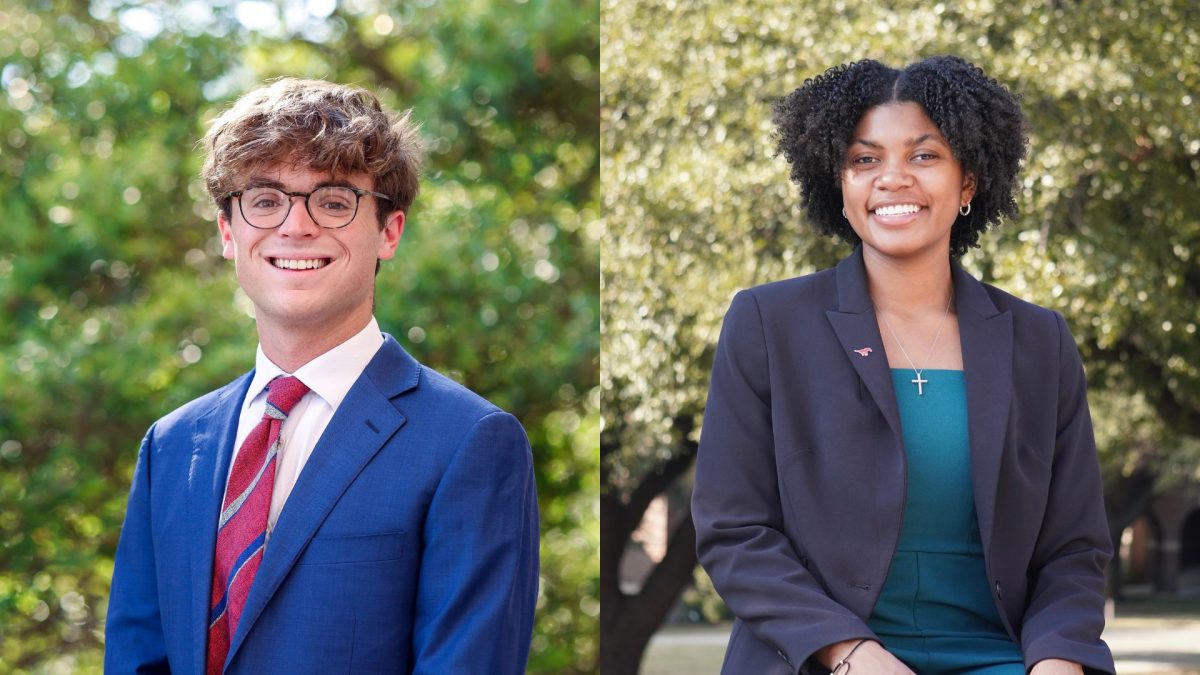
Sample graduation materials rest in a display case in Hughes-Trigg. (Casey Lee)
On a crisp morning in May, senior Bryan Melton will be walking across the stage smiling and shaking hands with various professors and deans, Flash photography will be nearly blinding him from his family. Reaching the end of the stage during the spring graduation commencement for him will signify the attainment of the goal he has been striving for over the last four years.
Little did he know that he would be walking away empty handed.
Melton recalls pulling all-nighters before tests, hours of group work and days spent in engineering labs all leading to one moment, one piece of paper.
“All of the hard work, four years of putting in all my effort were all driving toward the pinnacle moment where you get to hold up your diploma,” Melton said. “The ceremony almost isn’t complete unless you have that diploma.”
Melton and other seniors graduating in May will not be receiving diplomas at the commencement ceremony. Due to a change in the academic calendar, there is not sufficient time for the various schools to clear students for graduation. They instead will be receiving a blank diploma placeholder and will later receive the actual diploma in the mail.
“It’s like middle school all over again, just getting an empty shell that is meaningless,” Melton said.
According to Associate Provost Thomas Tunks, the decision to withhold diplomas was made by the Provost’s office. The decision came under consideration when the academic calendar was changed, and the time between finals and commencement was too short to clear students for graduation Tunks said.
Tunks said that it is not at all uncommon for graduating students to not receive diplomas at graduation, citing December and August graduations, where it has always been the practice of mailing out diplomas. He also said that there have been instances in the May commencement ceremonies where individual students could not be cleared in time and did not receive diplomas.
Assistant Registrar Gretchen Voight said 23 percent of seniors graduate in December, and 15 percent in August, representing 38 percent of graduating seniors traditionally receiving their diplomas in the mail.
The calendar change was due in part to a recommendation made by the Drug and Alcohol Task Force launched by President Turner in the spring semester of 2008.
“The calendar committee has a difficult job. To determine when the school year ends and commencement falls depends on many things, where spring break falls, and when classes begin,” Tunks said. “Part of it was the task force recommending shortening the lag time; having a lot of students here with nothing to do increases the chances of problems occurring.”
Student Body Vice President Patrick Kobler said the diploma at graduation has a deeper representation for many students.
“Some may say it is just a piece of paper, but what that paper represents is a college career. Aside from the $150,000 plus cost of it, it represents the friends we’ve made, the experiences, both good and bad we have learned from,” Kobler said. “It represents the all-nighters we pulled, both academically and social. In summary, it represents our transition from an adolescent into an adult.”
With so much value students put on the physical diploma, Kobler was pained to find that student’s party habits could affect such a valued tradition.
“There will always be people who make bad decisions, and I do not think the actions of the few should affect the many so drastically,” Kobler said. “As adults at graduation, students are capable of making their own decisions, and I do not think such a tradition as handing out diplomas should be sacrificed.”
Tunks said the decision to change the academic calendar was not made in haste or by one single entity. He said the calendar process is multistage. The Faculty Senate calendar committee works with the registrar’s office to draft the calendar.
The draft passes through the Provost’s office for approval, and is then passed to the president’s executive council, which consists of President Turner, all of the vice presidents, Athletic Director Steve Orsini and Treasurer Liz Williams for final approval.
Tunks said that after the process was complete, he said that various school records offices felt that there was insufficient time to clear students with the time crunch shrinking from one week to three days.
Hispanic-American Senator Sarah Acosta said this type of time pressure was not new to the graduating students.
“For the many all-nighters students pull in order receive these diplomas, I think the administration can pull one all-nighter for the students,” she said.
Kobler said it was wrong to make a decision that impacts students so greatly without any student input.
“I have brought it up to many seniors, and they always have the same reaction, first shock then anger,” Kobler said. “For such a drastic change, I firmly believe students should have been consulted. These are our diplomas and we, as a student body, should have had a say in the decision.”
Tunks was not sure if this would be a change that would remain for future commencement ceremonies. He said it was “beyond his ability to project” but the final decision rests with the Provost. He added that the decision would be made with the consult of the President and deans, not made in isolation.
Tunks said that the issue of handing out diplomas is the only change being made to the commencement ceremonies.
Melton and the rest of his senior class will experience a typical commencement ceremony, except this time the exclamation point of four years of hard work lies now in the hands of the U.S. Postal Service.








